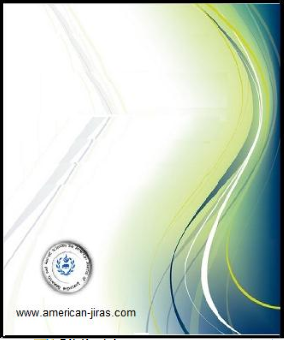
GENERAL INFORMATION
| HOME | ABOUT US | ARCHIVE | AIMS AND SCOP | AUTHORS | REVIEW | SUMIBMIT MANUSCRIPT | EDITORIAL BOARED | PUBLICATION FEE |

| HOME || ABOUT US || ARCHIVES || AIMS AND SCOP || AUTHORS || REVIEW|| SUBMIT MANUSCRIPT || EDITORIAL BOARD |

| Info-AJIRAS-® Journal ISSN 2429-5396 (Online) / Reference CIF/15/0289M |
American Journal of Innovative Research & Applied Sciences

|
American Journal of innovative
Research & Applied Sciences
Research & Applied Sciences
ISSN 2429-5396 (Online)
OCLC Number: 920041286
OCLC Number: 920041286

Authors Contact
*Correspondant author and authors Copyright © 2023:
| Manya Krishna 1*| Nday Wa Ngoy P 4 | Ntambwe Ndjakani P 1| Mbombo Ntumba V2 |
Kibwe Ngandwe D 2 | Bope Bomilongo M 2 | Ilunga Kasongo C 2 | Ilunga Kasongo C 2 |
Kitenge Lwenda L 3 | Arold FAZILI 3 | Ngoy MUNKANA Maloba M 4 | et | Mwangala Mwanda
F 2 | Manya Tsheko 1 |
Affiliation.
Gestion des Techniques Biomédicales, Institut Supérieur de Techniques Médicales de Lubumbashi, | RD Congo |
Section Sciences infirmières, Institut Supérieur de Techniques Médicales de Lubumbashi, | RD Congo |
Section Sciences infirmières, Institut Supérieur de Techniques Médicales de Likasi, | RD Congo |
Faculté des Sciences de Santé, Université de Malemba-Nkulu, | RD Congo |
This article is made freely available as part of this journal's Open Access: ID Manya-Ref1-6-16ajira110623 |


RESUME
Introduction : L'automédication est une pratique courante qui reflète la faible utilisation des services de santé, entraînant des consultations médicales tardives, des échecs thérapeutiques et une résistance microbienne. Objectif : Cette étude vise à identifier les facteurs contribuant à l'automédication à Lubumbashi. Méthodes : Une étude descriptive transversale a été menée de juillet 2022 à mai 2023 dans la zone de santé de Ruashi, dans la province du Haut-Katanga en RD Congo. L'échantillonnage a été réalisé de manière opportuniste, avec 384 participants. Résultats : Le manque de moyens financiers, le manque de confiance envers le personnel soignant, la distance entre le domicile et les services de santé, ainsi que la taille importante du foyer contribuent significativement à l'automédication. Conclusion : Pour lutter efficacement contre l'automédication à Lubumbashi, il est nécessaire de sensibiliser régulièrement la population aux inconvénients de retarder le recours aux services de santé, d'établir une tarification transparente prenant en compte le niveau socio-économique du patient, de garantir un financement durable des structures sanitaires par l'État et de lutter contre le chômage.
Mots clés : Facteurs, socioculturel, socio-économique, automédication.
SUMMARY
Background: Self-medication is a common practice that reflects the low utilization of health services, leading to late medical consultations, treatment failures and microbial resistance. Objective: This study aims to identify the factors contributing to self-medication in Lubumbashi. Methods: A cross-sectional descriptive study was conducted from July 2022 to May 2023 in the health zone of Ruashi, in the province of Haut-Katanga in DR Congo. Sampling was done opportunistically, with 384 participants. Results: The lack of financial means, the lack of trust in the nursing staff, the distance between the home and the health services, as well as the large size of the household contribute significantly to self-medication. Conclusion: To fight effectively against self-medication in Lubumbashi, it is necessary to regularly sensitize the population to the disadvantages of delaying the use of health services, to establish transparent pricing taking into account the socio-economic level of the patient, to guarantee sustainable financing of health structures by the State and to fight against unemployment.
Keywords: Factors, socio-cultural, socio-economic, self-medication.
Introduction : L'automédication est une pratique courante qui reflète la faible utilisation des services de santé, entraînant des consultations médicales tardives, des échecs thérapeutiques et une résistance microbienne. Objectif : Cette étude vise à identifier les facteurs contribuant à l'automédication à Lubumbashi. Méthodes : Une étude descriptive transversale a été menée de juillet 2022 à mai 2023 dans la zone de santé de Ruashi, dans la province du Haut-Katanga en RD Congo. L'échantillonnage a été réalisé de manière opportuniste, avec 384 participants. Résultats : Le manque de moyens financiers, le manque de confiance envers le personnel soignant, la distance entre le domicile et les services de santé, ainsi que la taille importante du foyer contribuent significativement à l'automédication. Conclusion : Pour lutter efficacement contre l'automédication à Lubumbashi, il est nécessaire de sensibiliser régulièrement la population aux inconvénients de retarder le recours aux services de santé, d'établir une tarification transparente prenant en compte le niveau socio-économique du patient, de garantir un financement durable des structures sanitaires par l'État et de lutter contre le chômage.
Mots clés : Facteurs, socioculturel, socio-économique, automédication.
SUMMARY
Background: Self-medication is a common practice that reflects the low utilization of health services, leading to late medical consultations, treatment failures and microbial resistance. Objective: This study aims to identify the factors contributing to self-medication in Lubumbashi. Methods: A cross-sectional descriptive study was conducted from July 2022 to May 2023 in the health zone of Ruashi, in the province of Haut-Katanga in DR Congo. Sampling was done opportunistically, with 384 participants. Results: The lack of financial means, the lack of trust in the nursing staff, the distance between the home and the health services, as well as the large size of the household contribute significantly to self-medication. Conclusion: To fight effectively against self-medication in Lubumbashi, it is necessary to regularly sensitize the population to the disadvantages of delaying the use of health services, to establish transparent pricing taking into account the socio-economic level of the patient, to guarantee sustainable financing of health structures by the State and to fight against unemployment.
Keywords: Factors, socio-cultural, socio-economic, self-medication.

| ISSN: 2429-5396 (e) | https://www.american-jiras.com | |
| Web Site Form: v 0.1.05 | JF 22 Cours, Wellington le Clairval, Lillebonne | France |
| Web Site Form: v 0.1.05 | JF 22 Cours, Wellington le Clairval, Lillebonne | France |
| JUNE | VOLUME 16 | ISSUE N° 6 | 2023 |
| ARTICLES | Am. J. innov. res. appl. sci. Volume 16, Issue - 6 Pages 354-360 (June 2023)
FACTEURS SOCIOCULTURELS ET SOCIO- ÉCONOMIQUES CONTRIBUANT A L’AUTOMÉDICATION DANS LES MENAGES A LUBUMBASHI: ÉTUDE DE CAS DE LA ZONE DE SANTÉ RUASHI
SOCIOCULTURAL AND SOCIO-ECONOMIC FACTORS CONTRIBUTING TO SELF-MEDICATION IN HOUSEHOLDS IN LUBUMBASHI: A CASE STUDY OF THE RUASHI HEALTH ZONE
| Manya Krishna 1*| Nday Wa Ngoy P 4 | Ntambwe Ndjakani P 1| Mbombo Ntumba V2 | Kibwe Ngandwe D 2 | Bope Bomilongo M 2 | Ilunga Kasongo C 2 | Ilunga Kasongo C 2 | Kitenge Lwenda L 3 | Arold FAZILI 3 | Ngoy MUNKANA Maloba M 4 | et | Mwangala Mwanda F 2 | Manya Tsheko 1 |Am. J. innov. res. appl. sci. 2023; 16(6):354-360.
| PDF FULL TEXT | | XML FILE | | Abstract and Author Contact |
SOCIOCULTURAL AND SOCIO-ECONOMIC FACTORS CONTRIBUTING TO SELF-MEDICATION IN HOUSEHOLDS IN LUBUMBASHI: A CASE STUDY OF THE RUASHI HEALTH ZONE
| Manya Krishna 1*| Nday Wa Ngoy P 4 | Ntambwe Ndjakani P 1| Mbombo Ntumba V2 | Kibwe Ngandwe D 2 | Bope Bomilongo M 2 | Ilunga Kasongo C 2 | Ilunga Kasongo C 2 | Kitenge Lwenda L 3 | Arold FAZILI 3 | Ngoy MUNKANA Maloba M 4 | et | Mwangala Mwanda F 2 | Manya Tsheko 1 |Am. J. innov. res. appl. sci. 2023; 16(6):354-360.
| PDF FULL TEXT | | XML FILE | | Abstract and Author Contact |